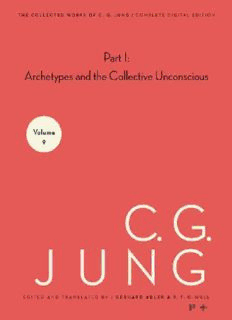
The Archetypes of the Collective Unconscious PDF
Preview The Archetypes of the Collective Unconscious
* Published 1957; 2nd edn., 1970. + Published 1973. * Published 1960. + Published 1961. ‡ Published 1956; 2nd edn., 1967. (65 plates, 43 text figures.) * Published 1971. + Published 1953; 2nd edn., 1966. ‡ Published 1960 and edn., 1969. * Published 1959; 2nd edn., 1968. (Part I: 79 plates, with 29 in colour.) * Published 1964; 2nd edn., 1970. (8 plates.) † Published 1958; 2nd edn., 1969. * Published 1953; 2nd edn., completely revised, 1968. (270 illustrations.) † Published 1968. (50 plates, 4 text figures.) ‡ Published 1963; 2nd edn., 1970. (10 plates.) * Published 1966. † Published 1954; 2nd edn., revised and augmented, 1966. (13 illustrations.) ‡ Published 1954. B O L L I N G E N S E R I E S X X THE COLLECTED WORKS OF C. G. JUNG VOLUME 9, PART 1 EDITORS †SIR HERBERT READ MICHAEL FORDHAM, F.R.C.PSYCH., HON. F.B.PS.S. GERHARD ADLER, PH.D. WILLIAM MCGUIRE, executive editor Mandala of a Modern Man THE ARCHETYPES AND THE COLLECTIVE UNCONSCIOUS SECOND EDITION C. G. JUNG TRANSLATED BY R. F. C. HULL B O L L I N G E N S E R I E S X X COPYRIGHT © 1959 BY BOLLINGEN FOUNDATION INC., NEW YORK, N.Y. NEW MATERIAL COPYRIGHT © 1969 BY PRINCETON UNIVERSITY PRESS SECOND EDITION, 1968 third printing, 1971 fourth printing, 1975 fifth printing, 1977 First Princeton / Bollingen Paperback printing, 1980 THIS EDITION IS BEING PUBLISHED IN THE UNITED STATES OF AMERICA BY PRINCETON UNIVERSITY PRESS, AND IN ENGLAND BY ROUTLEDGE AND KEGAN PAUL, LTD. IN THE AMERICAN EDITION, ALL THE VOLUMES COMPRISING THE COLLECTED WORKS CONSTITUTE NUMBER XX IN BOLLINGEN SERIES, SPONSORED BY BOLLINGEN FOUNDATION. THE PRESENT VOLUME IS NUMBER 9 OF THE COLLECTED WORKS AND WAS THE EIGHTH TO APPEAR. IT IS IN TWO PARTS, PUBLISHED SEPARATELY, THIS BEING PART I. LIBRARY OF CONGRESS CATALOG CARD NUMBER: 75-156 ISBN 0-691-09761-5 ISBN 0-691-01833-2 PBK. MANUFACTURED IN THE U. S. A. BY PRINCETON UNIVERSITY PRESS AT PRINCETON, N. J. EDITORIAL NOTE The concept of archetypes and its correlate, that of the collective unconscious, are among the better known theories developed by Professor Jung. Their origins may be traced to his earliest publication, “On the Psychology and Pathology of So-called Occult Phenomena” (1902),* in which he described the fantasies of an hysterical medium. Intimations of the concepts can be found in many of his subsequent writings, and gradually tentative statements crystallized and were reformulated until a stable core of theory was established. Part I of Volume 9 consists of essays—written from 1933 onward— describing and elaborating the two concepts. The volume is introduced by three essays establishing the theoretical basis, followed by others describing specific archetypes. The relation of these to the process of individuation is defined in essays in the last section. Part II of the volume, entitled Aion and published separately, is devoted to a long monograph on the symbolism of the self as revealed in the “Christian aeon.” Together the two parts give the nucleus of Jung’s work on the theory and meaning of archetypes in relation to the psyche as a whole. * While the illustrations that accompany the last two papers are the same subjects published with the Swiss versions in Gestaltungen des Unbewussten, they have now been rephotographed and improved in presentation. It has been possible to give the entire pictorial series illustrating “A Study in the Process of Individuation” in colour and to add seven additional pictures, which were chosen by the author from those in his possession (par. 616). Several of the illustrations for “Concerning Mandala Symbolism,” also, are now given in colour. Grateful acknowledgment is made to Mrs. Aniela Jaffé and to Mrs. Margaret Schevill-Link for their kind assistance in connection with the pictures. The frontispiece was published in the Swiss magazine Du (April 1955), with the brief article by Professor Jung on mandalas which is given in the appendix. This “Mandala of a Modern Man” was painted in 1916. EDITORIAL NOTE TO THE SECOND EDITION Bibliographical citations and entries have been revised in the light of subsequent publications in the Collected Works and essential corrections have been made. Jung’s acknowledgment in his Memories, Dreams, Reflections of having painted the mandala illustrated in the frontispiece, and four other mandalas in this volume, is explained on page 355, n.1. TRANSLATOR’S NOTE Grateful acknowledgment is made to those whose translations have been consulted: Mr. W. S. Dell, for help derived from his translations of two papers: “Archetypes of the Collective Unconscious” and “The Meaning of Individuation” (here entitled “Conscious, Unconscious, and Individuation”), both published in The Integration of the Personality; Mrs. Cary F. Baynes and Miss Ximena de Angulo, for permission to use, virtually unchanged, long portions of their translations of “Psychological Aspects of the Mother Archetype” and “Concerning Rebirth,” issued in Spring (New York), 1943 and 1944; and to Miss Hildegard Nagel, for reference to her translation of “The Psychology of the Trickster-Figure,” in Spring, 1955.
Description: